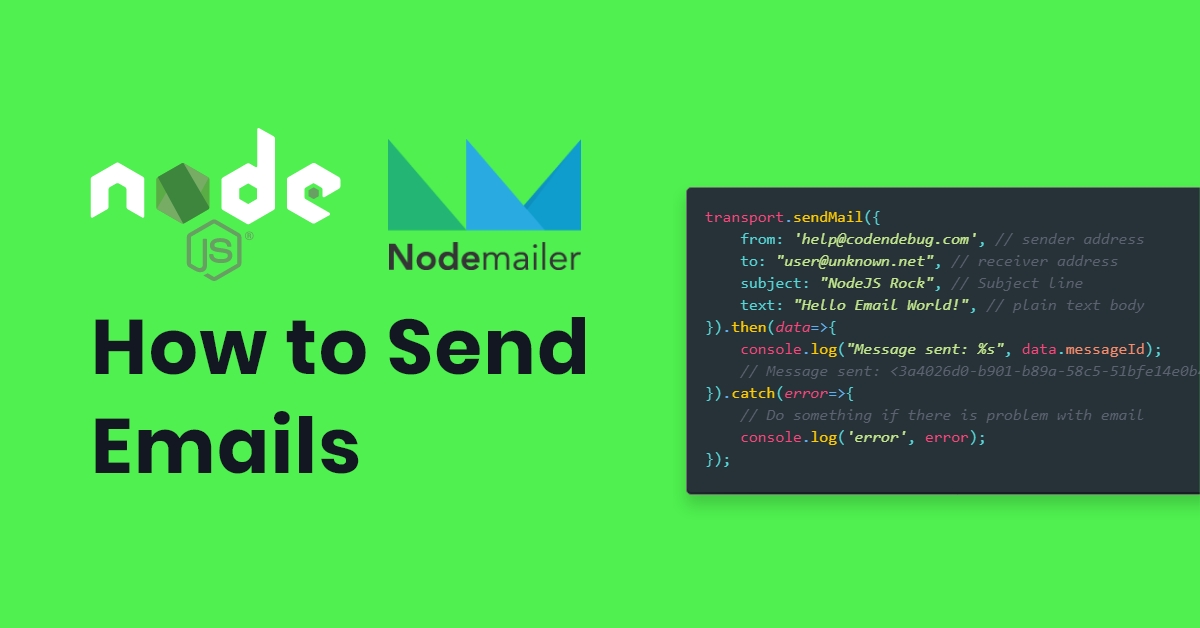
Send email with NodeJS
Ken C
Nov 08, 2020 · 2 min read
One of the core functionality of an application is to send an email to the users. This email notification allows you to know what's happening in your account or transaction.
Luckily, NodeJS provides an easy way to send an email.
Prerequisite
Before we can begin make sure you have NodeJS installed in your machine. You need to have at least node v6 or the latest.
Getting Started
One of the popular packages that NodeJS developers used to send email is nodemailer. It allows you to easily integrate email sending to your application.
Installation
Let's create a project folder then initialize our npm by running these commands
mkdir sendemail
cd ./sendemail
npm init -y
{
"name": "sendemail",
"version": "1.0.0",
"description": "",
"main": "index.js",
"scripts": {
"test": "echo \"Error: no test specified\" && exit 1"
},
"keywords": [],
"author": "",
"license": "ISC"
}
We can now install nodemailer by running
npm install nodemailer
NPM will install the package that we can conveniently import in our codes.
Start Coding
We can now start creating our first email.
Let's create email.js
// first let's import our package
const mailer = require('nodemailer');
// create a transport object
const transport = mailer.createTransport({
// put the mail server config
host: 'smtp.mailtrap.io',
port: 2525,
auth: {
user: 'put_your_username_here',
pass: 'put_your_password_here'
}
})
The code above will create a transport object that allows you to connect to a mail server which sends the email for you.
Since we don't have a mail server we can use MailTrap service to get a mail server config.
You can follow these steps to setup your MailTrap account.
- Create an account in MailTrap https://mailtrap.io/register/signup?ref=header.
- Verify your account by
confirmingyour email. - After you verify, login to your account then, go to
My Inbox - Click Integrations, then select
nodemailer. You should see something like this.

We can now use this transport to test our email sender.
Let's create a message for our email sender.
const mailer = require('nodemailer');
const transport = mailer.createTransport({
host: 'smtp.mailtrap.io',
port: 2525,
auth: {
user: '87393cbab942d5',
pass: '00f8bc09b0a566'
}
});
// send mail with defined transport object
transport.sendMail({
from: 'help@codendebug.com', // sender address
to: "user@unknown.net", // receiver address
subject: "NodeJS Rock", // Subject line
text: "Hello Email World!", // plain text body
}).then(data=>{
console.log("Message sent: %s", data.messageId);
// Message sent: <3a4026d0-b901-b89a-58c5-51bfe14e0b42@codendebug.com>
}).catch(error=>{
// Do something if there is problem with email
console.log('error', error);
});
Now you will receive something like this.

Congrats, you can now send email in NodeJS.
Summary
We can add more functionality to our email by adding email templates, receipient list, add emojis, and adding attachments. All thanks to the Nodemailer team which makes email sending fun and easy.
Part 2 - Templating Email with NodeJS
Happy Coding 😃